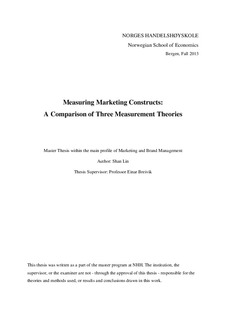| dc.description.abstract | A large number of new constructs are introduced into marketing. These new constructs are
important in the development of marketing theories. The validation of these constructs are
primarily based on a factor analytical framework (e.g., Churchill’s paradigm), with a
validation rationale found in Classical Test Theory. However as the limitations of Classical
Test Theory are widely realized by many researchers, alternative measurement theories might
provide better and more coherent guidelines for marketing researchers with regard to how to
measure and validate marketing constructs. In this thesis I look at two alternative
measurement theories, Item Response Theory and Generalizability Theory, in addition to
Classical Test Theory. Both Item Response Theory and Generalizability Theory have
recently become more important for marketing measurement. This thesis addresses how the
constructs are measured based on these three theories and how these measurement theories
differ from each other. After a detailed review of each theory, the theories are contrasted,
especially in terms of construct validation. It is found that Classical Test Theory, Item
Response Theory, and Generalizability Theory vary in how they address different
measurement issues. They differ in terms of how constructs are defined, measured, and
validated. However, the validation process employed for these three theories can only
provide empirical evidence, or indications, for the construct validity but cannot provide
evidence as to whether constructs exist or not. This will be a challenging research question
for future research. | no_NO |
